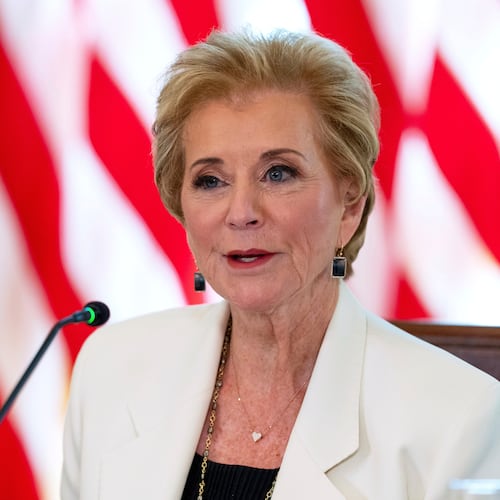The Trump administration notified education departments across the nation this week that they will withhold almost $7 billion in grants that fund teacher training, English-language learners and after-school programs.
That means more than $200 million earmarked for Georgia’s public schools will essentially be frozen, according to the nonprofit education think tank Learning Policy Institute.
The funds are disbursed to local school districts by the Georgia Department of Education, which was notified by the U.S. Education Department that the money is under review.
“(Georgia) Superintendent (Richard) Woods is strongly committed to ensuring school districts have access to the funds they need to successfully start the school year,” a spokesperson for the Georgia Department of Education said. “He will request a called State Board of Education meeting, if necessary, to distribute funds to districts as quickly as possible once they are released by (federal officials).”
Congress approved the funds in March, but U.S. Office of Management and Budget Director Russell Vought recently suggested his department may try to claw back the money. Federal officials say some states have used the grants to promote “a radical leftwing agenda.” The decision to delay funding has some education advocates worried about programs that depend on the grants to survive.
Jodi Grant, executive director of the national nonprofit Afterschool Alliance, estimated 10,000 after-school programs in the U.S. will be affected by the funding delay.
“Parents across the country are counting on these programs to support programming for their kids this summer, this fall and throughout the next school year, and … every hour that (the funds are) withheld means that programs are scrambling, and many are going to have to close,” Grant said.
Local districts, like Fulton County Schools, are trying to make those decisions now. Fulton would miss out on $8.2 million in funds used for professional learning, English-as-a-second-language instruction and after-school programs. District officials said a loss of funds would mean some after-school programs could be strained or lost because parents wouldn’t be able to afford the costs on their own.
“Our personnel and programs remain on hold until (a) final financial decision is made by the U.S. Department of Education,” a spokesperson said. “We’ve paid for personnel but not the programs.”
If federal officials don’t release the funds, Fulton officials said the school board or superintendent may allocate money from other sources, although programs would likely be pared back. The district said it may have to cancel some services.
The DeKalb County School District said it’s awaiting guidance from the Georgia Department of Education. The district was also notified that funding from the Adult Education and Family Literacy Act, which funds adult education programs, has also been delayed while under review.
Atlanta Public Schools expected to receive almost $5.3 million in federal grants for professional development, academic enrichment, English-learner services and before- and after-school programs.
Officials with Gwinnett County schools said they’re reviewing the details of the funding delay to understand what the impact may be.
An official with the U.S. Office of Management and Budget said the funds are not “frozen” or “impounded,” but under review. The office issued the following statement to The Atlanta Journal-Constitution:
“This is an ongoing programmatic review of education funding. Initial findings show that many of these grant programs have been grossly misused to subsidize a radical leftwing agenda. In one case, N.Y. public schools used English Language Acquisition funds to promote illegal immigrant advocacy organizations. In another, Washington state used funds to direct illegal immigrants toward scholarships intended for American students. In yet another, School Improvement funds were used to conduct a seminar on ‘queer resistance in the arts.’ As stated before, this is an ongoing programmatic review and no decisions have been made yet.”
The OMB has not yet responded to follow-up questions about Georgia’s use of funds.
About the Author
Keep Reading
The Latest
Featured



